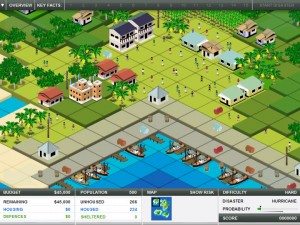The SLAV Personal learning Network for Victoria Schools PD project continues – it has been wonderful and this week, we listened to the Elluminate session with Adrian Camm and Hamish Curry and watched the video of the very enthusiastic Jane McGonigal: Gaming can make a better world TED Talk. They spoke with great passion for the use of games in education. There is no doubt, they would be popular.
Whilst I can see the potential of games in education, and admit that there are skills that can be applied within game environments, I struggle to understand how this can be applied in the Primary School environment to any great degree. I understand the theory behind ‘learning through play’ but feel that our current education system stiffles this potential to some degree.
I have used simulation games eg Stop Disasters – A disaster simulation game from the UN/International Strategy for Disaster Reduction . This was wonderful and many learning opportunities came out of it. I believe that this worked as it was a short activity – each episode takes 20 minutes, the children could repeat it a few times and apply new learning each time. This was manageable within a class environment and busy school curriculum. It most certainly engaged the children and had them thinking. I can definitely see how this sort of game playing can enrich understandings , require problem solving skills and motivate learners. I have no doubt that those students remember some of the factors that can minimise harm and prevent injuries from Natural disasters much more than they would have if they had simply read a book.
 Earlier this year, I was fortunate enough to hear Michael Furdyk from TakingITGlobal speak and he showed some of the simulation games that his organisation has created or supported. They are amazing as they deal with solving or highlighting world issues -Millenium Development goals, food shortages etc. Games for change. Well worth a look.
Earlier this year, I was fortunate enough to hear Michael Furdyk from TakingITGlobal speak and he showed some of the simulation games that his organisation has created or supported. They are amazing as they deal with solving or highlighting world issues -Millenium Development goals, food shortages etc. Games for change. Well worth a look.
It would take some considerable planning and more flexibility than is currently available within the current primary school curriculum to enable major use of on-line games that go for extended periods . Thankfully there are a few as I have illustrated above that are shorter term. Unfortunately, whilst we have such stringent requirements to cover content, I wonder how it could work. Any ideas? experiences?
PS Since first posting, Judith made me aware of some work being done with Wii and Nintendo in schools (see comments for details) and I stumbled upon the work of Jen Deyenberg from Canada. They are both using these tools with success in Primary classrooms. This is a different sort of gaming than I was thinking of and referring to earlier … Our iPod Touch pilot program has similar possibilities – will keep thinking …..
